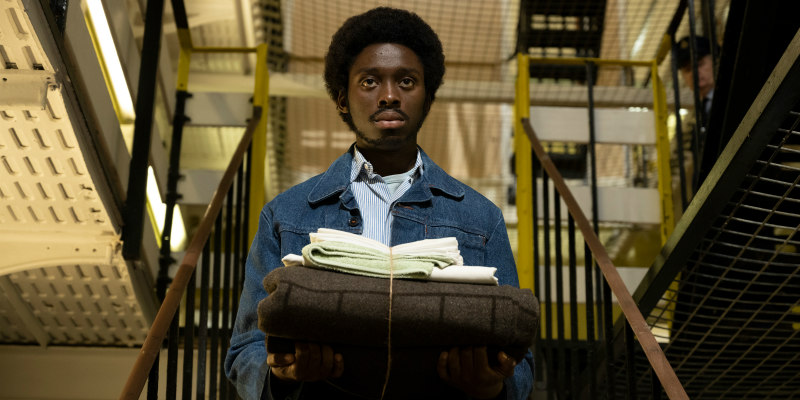
Review by
Eric Hillis
Directed by: Steve McQueen
Starring: Sheyi Cole, Jonathan Jules, Asad-Shareef Muhammad, Robbie Gee

I knew nothing about British writer Alex Wheatle when I sat down to watch
the fourth instalment of Steve McQueen's 'Small Axe' anthology that
bears his name. When the credits rolled a brief 66 minutes later, I still
didn't know a whole lot about Wheatle. The first misstep in McQueen's
otherwise impressive compendium of films exploring London's West Indian
community in the fraught years from the 1960s to the '80s,
Alex Wheatle offers little more than a rushed overview of the
author's youth.

Opening in media res, we find Wheatle (Sheyi Cole) beginning a short
prison term, punishment for having been arrested while partaking in the
Brixton riots of 1981. There he meets his cellmate, Simeon (Robbie Gee), a towering Rastafarian whose ongoing hunger strike has filled the small
cell with the odour of diarrhea. Wheatle is angry at the world, and tries to
take it out on Simeon, who easily overpowers him and gradually teaches him
to channel his frustration into reading and autodidactism.
Through flashbacks we see Wheatle as a boy (Asad-Shareef Muhammad),
placed into a prison-like orphanage where he is bullied by both his adult
supervisors and the other, predominantly white kids. Turning 18, Wheatle is
transferred from rural Surrey to the London borough of Brixton. Having spent
all of his life standing out because of the colour of his skin, he now
stands out in the largely Black borough because he speaks and acts like a
middle class White boy.

Wheatle is taken under the wing of Dennis (Jonathan Jules), a
fast-talking Jamaican who teaches the young man how to fit in with his new
surroundings. The relationship between Wheatle and Dennis is largely
reminiscent of that between Jon Voight's naive hick and Dustin Hoffman's
streetwise New Yorker in Midnight Cowboy. Dennis is initially exploiting Wheatle's innocence, but the two come to
share a genuine friendship.
At just over an hour in length, and ending before Wheatle has ever sat down
at a typewriter, McQueen's film plays more like the first act of a more
in-depth biopic than a standalone film. The writer's youth is thinly
sketched in vignettes that might feel more at home in generic urban crime
dramas. Halfway through, Wheatle becomes a drug dealer, something the film
never grapples with, likely for fear of painting its subject in a negative
light. His arc from cardigan clad, wide-eyed innocent to leather jacket
wearing tough guy never quite convinces because McQueen and
co-writer Alastair Siddons skip too many rungs of Wheatle's
climb ascent on this narrative ladder.

Of the four chapters of 'Small Axe' that have thus far debuted,
Alex Wheatle is the first that looks like it was made
specifically for TV. There's little of McQueen's visual mastery on display
here, with only an extended shot of a young Wheatle lying on a floor while
confined in a straitjacket reminding us that this is the work of one of the
best filmmakers of his generation. Too much of
Alex Wheatle relies on crudely written speechifying from
supporting characters lecturing the title character on how to fit in or
stand out. As a biopic of a literary figure, it's far too literal in its
storytelling, the weakest point in McQueen's stellar career to date.


